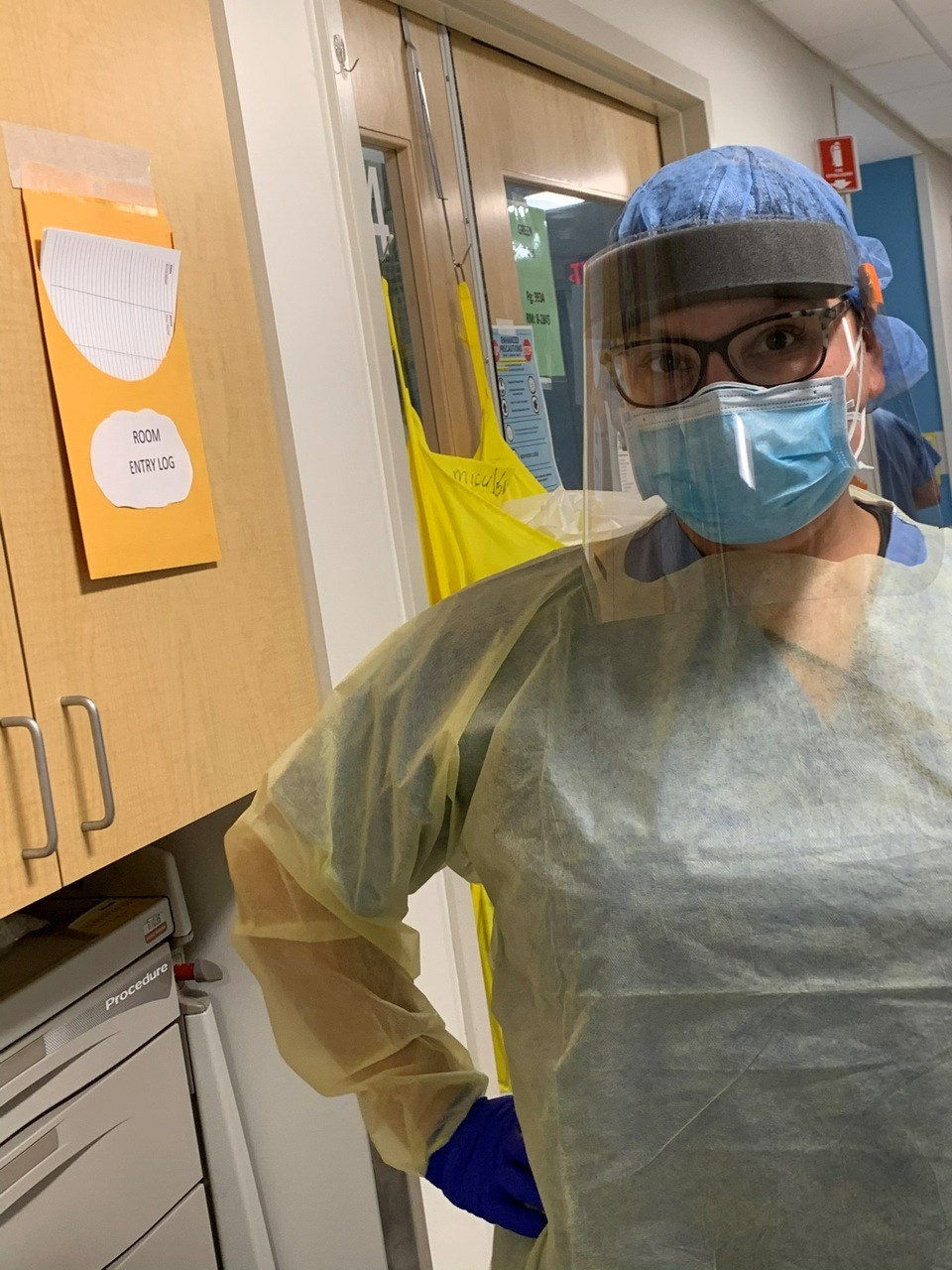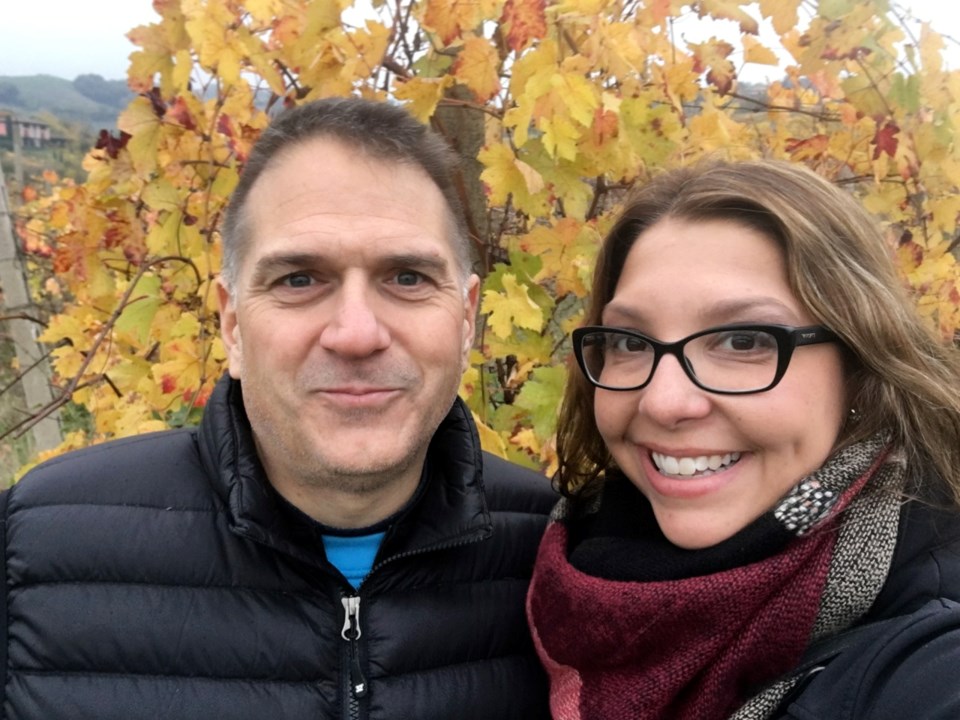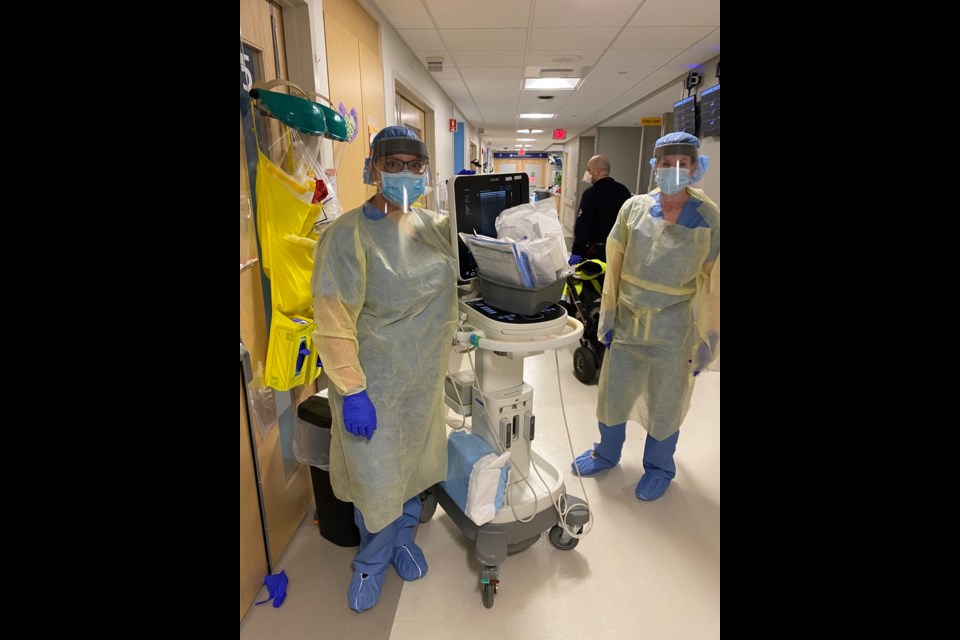Katie Bell says she has never seen anything like what she saw working for two months at a busy Boston hospital during the COVID-19 pandemic.
She had been a nurse practitioner during the H1N1 pandemic in 2009-10, and she worked at the busiest hospital in the city following the Boston Marathon bombing in 2013.
But it has all been surpassed by the activity caused by COVID-19.
“I’ve never seen such illness in all of my career,” she said in an interview with the Mercury last week while in quarantine, just days after returning to Estevan.
But she did see some good things emerge while working in Boston.
Bell resides in Estevan most of the year and works as a registered nurse in the emergency room at St. Joseph’s Hospital. She is also a nurse injector at Diamond Skin Solutions.
But she was born and raised in Boston, and came to Estevan a few years ago to be with her fiancée Brian Senchuk. She has worked as an acute care nurse practitioner who specializes in critical care in the U.S., and spent 15 years at the Boston Medical Centre – a 550-bed hospital.
“I received a call in early March that the situation in Boston was heating up, and that they were in dire straits, and that they needed help,” she said in an interview with the Mercury.
Prior to COVID-19’s outbreak, she said they had projected the number of COVID patients, and expected it would be an “all hands on deck” situation to try to help these intensive care unit (ICU) patients.
“My bosses at St. Joseph’s Hospital were very gracious and they allowed me to take a leave of absence so that I could go and work back in my old ICU as a nurse practitioner in Boston,” she said.
Her boss at Diamond Skin Solutions, Kelly McConnell, was also supportive.
Bell was in Boston from March 19-May 19.
There was a lot of anxiety about going to work in Boston, because there were reports of healthcare professionals becoming ill and a shortage of personal protective equipment (PPE). Bell and her fellow workers would be working long shifts for several days in a row.
She couldn’t even stay with her mother, because her mom is at a high-risk of COVID-19. So Bell stayed with a friend who is a physician at the hospital.

“Our ICU typical patient loads every day quadrupled. We typically have three medical ICU teams, a surgical ICU team, a neuro-critical care ICU team and a cardiac ICU team, and we had to double our teams, just to try to be able to take care of these patients.”
Most patients required a breathing tube, and many ultimately had to be sedated or chemically paralyzed. They also had to be positioned in certain ways to help with oxygenation.
Some of the health care providers became ill as well.
PPE included two gowns, two masks, four pairs of gloves, welder’s shields and a cap, making it tough to care for a patient. Her nose is still bruised, her forehead is soft from all the headgear needed and her hands bleed from using Purell so much.
People from other states were calling her and other team members because there was such a shortage of ICU-trained people who could manage the severity and complexity of the illness.
Nurse practitioners had to perform ICU triage, so any patients who may require ICU admission had to go through them.
“We had to go to the floors and assess all these patients … and we ultimately were the ones who decided who got the limited number of ICU beds. So there was a tremendous feeling of guilt if you didn’t allot a bed to somebody, because you thought they were beyond help,” said Bell.
If there was a 30-year-old patient and an 80-year-old patient, the 30-year-old always received the bed, leaving the healthcare workers with a horrible feeling.
But she was quick to add she has never seen such teamwork.
“Everyone threw themselves in trying to help these patients,” she said. “Most times it was futile, but we did everything we could to try to help these people.”
Nurse practitioners had to help run an ICU team, and they had to bring a “plethora” of different types of specialties on their team. Since a lot of elective surgeries weren’t going on, there were surgical residents who came to help in her medical ICU.
Procedures included putting in central venous catheters, arterial lines to monitor blood pressure, and kidney dialysis lines even though some had no kidney problems before contracting COVID.
Many generous companies donated items such as gowns and face shields, schools supplied materials they could, and businesses provided food.
And the hospital staff found ways for patients to interact with their families, even though they couldn’t have visitors. There were FaceTime family meetings and visitations with patients. If someone was nearing end of life, one visitor was allowed in to be with them.
“I can say that no patient died alone. Every patient had a nurse or one of us with them, so that they would know that someone cared for them,” said Bell.
So many people were supportive, but she encountered so much fear that it created isolation. Some called her dangerous or dirty when she was outside the hospital, which was the most challenging and hurtful part.
As of Monday afternoon, Massachussets had 96,965 confirmed cases, and 6,846 deaths, leaving it fifth in the U.S. for case load.
It was rewarding to have been part of this, Bell said, and she knows she made the right decision to go down there, but it came at a cost to herself, her fiancée and her loved ones. And she doubts that anyone who worked through this will ever be the same.
She wants people to realize that COVID-19 is a serious situation. Estevan and other communities haven’t experienced the surge of COVID-19 cases seen elsewhere – there have only been 17 in the south region as of Monday.
“But there are places that have been so impacted by this. It is real, and it’s very scary. A lot of the patients that we saw were normal people. They maybe had a little high blood pressure, and maybe were a little overweight. But as a whole, they were relatively healthy people, and they succumbed to this virus.

Bell said it feels good to be home. A week before returning to Canada, she took a COVID-19 test, because she wanted to ensure the people around her were safe. The test came back negative.
And both she and Senchuk have been in quarantine since she returned home.
“It’s been really nice just to have this time together, and to work on our house projects and things like that.”
They were supposed to be married a couple of weeks ago, but that had to be rescheduled due to the pandemic – an experience many other couples have encountered. But they have a new date set and they’re looking forward to the big day.
Bell will be back to work at St. Joseph’s Hospital on June 11, and she’ll be back to work at Diamond Skin Solutions on June 8 when the business is allowed to be open again as part of Phase 3 of the Re-Open Saskatchewan Plan.




